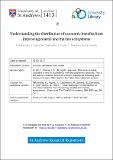Files in this item
Understanding the distribution of economic benefits from improving coastal and marine ecosystems
Item metadata
| dc.contributor.author | Pakalniete, Kristine | |
| dc.contributor.author | Aigars, Juris | |
| dc.contributor.author | Czajkowski, Mikołaj | |
| dc.contributor.author | Strake, Solvita | |
| dc.contributor.author | Zawojska, Ewa | |
| dc.contributor.author | Hanley, Nick | |
| dc.date.accessioned | 2018-01-28T00:31:40Z | |
| dc.date.available | 2018-01-28T00:31:40Z | |
| dc.date.issued | 2017-04-15 | |
| dc.identifier | 249027069 | |
| dc.identifier | af7f27bf-12c5-48b4-86c5-55963d21d952 | |
| dc.identifier | 85010737660 | |
| dc.identifier | 000399358500004 | |
| dc.identifier.citation | Pakalniete , K , Aigars , J , Czajkowski , M , Strake , S , Zawojska , E & Hanley , N 2017 , ' Understanding the distribution of economic benefits from improving coastal and marine ecosystems ' , Science of the Total Environment , vol. 584–585 , pp. 29-40 . https://doi.org/10.1016/j.scitotenv.2017.01.097 | en |
| dc.identifier.issn | 0048-9697 | |
| dc.identifier.other | RIS: urn:2582E11FC68CD91564C14335D7326F35 | |
| dc.identifier.uri | https://hdl.handle.net/10023/12624 | |
| dc.description | The study was carried out within the project “Good environmental status through regional coordination and capacity building” (GES-REG) funded by the Central Baltic INTERREG IV A Programme 2007–2013. MC acknowledges the support of the Polish Ministry of Science and Higher Education and the National Science Centre of Poland (project 2015/19/D/HS4/01972). SS thanks the project “Development of the ships' ballast water management system to reduce biological invasions” (BALMAN, 2015–2017) for funding her work. NH thanks MASTS (HR09011) (www.masts.ac.uk) for funding a part of his work. | en |
| dc.description.abstract | The ecological status of coastal and marine waterbodies world-wide is threatened by multiple stressors, including nutrient inputs from various sources and increasing occurrences of invasive alien species. These stressors impact the environmental quality of the Baltic Sea. Each Baltic Sea country contributes to the stressors and, at the same time, is affected by their negative impacts on water quality. Knowledge about benefits from improvements in coastal and marine waters is key to assessing public support for policies aimed at achieving such changes. We propose a new approach to account for variability in benefits related to differences in socio-demographics of respondents, by using a structural model of discrete choice. Our method allows to incorporate a wide range of socio-demographics as explanatory variables in conditional multinomial logit models without the risk of collinearity; the model is estimated jointly and hence more statistically efficient than the alternative, typically used approaches. We apply this new technique to a study of the preferences of Latvian citizens towards improvements of the coastal and marine environment quality. We find that overall, Latvians are willing to pay for reducing losses of biodiversity, for improving water quality for recreation by reduced eutrophication, and for reducing new occurrences of invasive alien species. However a significant group within the sample seems not to value environmental improvements in the Baltic Sea, and, thus, is unwilling to support costly measures for achieving such improvements. The structural model of discrete choice reveals substantial heterogeneity among Latvians towards changes in the quality of coastal and marine waters of Latvia. | |
| dc.format.extent | 12 | |
| dc.format.extent | 1313845 | |
| dc.language.iso | eng | |
| dc.relation.ispartof | Science of the Total Environment | en |
| dc.subject | Good environmental status | en |
| dc.subject | Coastal and marine water quality | en |
| dc.subject | Biodiversity | en |
| dc.subject | Invasive alien species | en |
| dc.subject | Eutrophication | en |
| dc.subject | Discrete choice experiment | en |
| dc.subject | Observed preference heterogeneity | en |
| dc.subject | Socio-demographic characteristics | en |
| dc.subject | Hybrid choice model | en |
| dc.subject | G Geography (General) | en |
| dc.subject | GE Environmental Sciences | en |
| dc.subject | HB Economic Theory | en |
| dc.subject | DAS | en |
| dc.subject | SDG 14 - Life Below Water | en |
| dc.subject.lcc | G1 | en |
| dc.subject.lcc | GE | en |
| dc.subject.lcc | HB | en |
| dc.title | Understanding the distribution of economic benefits from improving coastal and marine ecosystems | en |
| dc.type | Journal article | en |
| dc.contributor.institution | University of St Andrews. Geography & Sustainable Development | en |
| dc.identifier.doi | https://doi.org/10.1016/j.scitotenv.2017.01.097 | |
| dc.description.status | Peer reviewed | en |
| dc.date.embargoedUntil | 2018-01-27 |
This item appears in the following Collection(s)
Items in the St Andrews Research Repository are protected by copyright, with all rights reserved, unless otherwise indicated.

